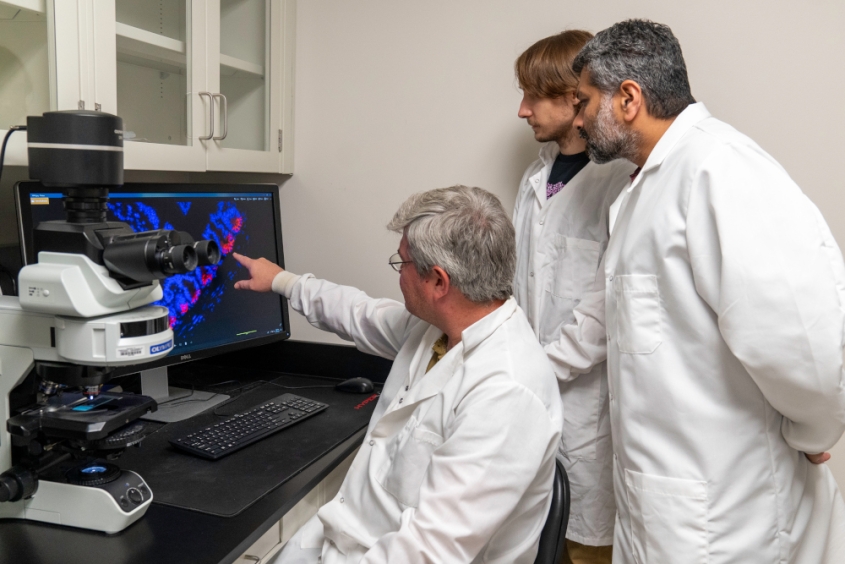Catalyzing Research Breakthroughs
At the College of Veterinary Medicine, scientific research informs all of our goals, from improving clinical outcomes for our clients, to shaping the material we teach the next generation of experts, to forging future breakthroughs in human and animal health. CVM’s scientific pursuits serve as a nexus between Weill Cornell Medicine and other Cornell colleges, with CVM serving an essential role in initiating, developing and sustaining numerous interdisciplinary collaborations.
In the college’s previous strategic plan, we established several research goals and successfully achieved important milestones that included expanding interdisciplinary collaboration and significantly growing grant funding sources and resources. Looking ahead, our efforts and investments will remain focused on a diverse portfolio of priorities: public health; infectious disease; antimicrobial resistance; immunology; genomics; cancer biology; reproductive biology and women’s health; stem cell biology and regenerative medicine; dairy and sustainable food production; understanding the linkages between environmental, animal, and human health; and applied clinical research.
Across Cornell, networks of scientists tackle challenging animal and human health problems. To take greatest advantage of this collective momentum, the college will prioritize advances in innovative, exemplary and collaborative research by targeting several new and ambitious goals:
Accelerate novel research in biomedicine and animal health
The college will create a signature Grand Challenges Seed Grant Program to launch multidisciplinary projects ranging from fundamental discovery to clinical application, with a focus on key areas such as cancer biology; reproduction and women’s health; and infection biology – all with an emphasis on comparative genomic technologies. To do this, we will:
- Identify and study critical issues of global significance in collaboration with other Cornell colleges, including Weill Cornell Medicine, and with external partners.
- Prioritize proposals that emphasize collaboration across disciplines and departments which will lead to increased external funding and diversification of our funding portfolio. Examples would include any research areas in which the CVM offers a unique perspective, such as diverse animal models for human disease, innovations in comparative genomics, and infection biology and emerging zoonotic diseases.
- Translate our scientific innovations to market/practical applications.
Improve research infrastructure and supports to drive innovation
Our college must be poised to leverage rapidly advancing scientific technologies. Investing in advanced methodologies will lead to greater impact of college research programs. To do this, we will:
- Reorganize and consolidate efforts to increase scope and efficiency in research. While already an area of expertise for the college, a faculty working group will evaluate our current pre-clinical, clinical and translational research capabilities and make recommendations to increase our capacity and visibility in this area. Work on the Ithaca campus and at Cornell University Veterinary Specialists (CUVS), Cornell Ruffian Equine Specialists (CRES), Animal Health Diagnostic Center (AHDC) regional laboratories and external collaborators will be considered. This initiative will elevate CVM as the hub to bridge gaps between basic scientific discoveries and the development of new treatments for animals and humans. Our enhanced capabilities in these areas will provide a range of tools and approaches to help scientists and clinicians work together to translate laboratory findings into potential therapies.
- Foster the growth and complementary work of the Baker Institute for Animal Health (Baker), the Feline Health Center (FHC), the Richard P. Riney Canine Health Center (RCHC), Duffield Institute for Animal Behavior (DIAB), the K. Lisa Yang Center for Wildlife Health, and Cornell Equine to generate advances in animal health and disseminate new research discoveries through education, public outreach and translation to clinic/market. We will increase the reach and public engagement of these programs that will, in turn, lead to opportunities for new funding of these research endeavors.
- Establish a research development team to enhance our grant funding capabilities, expand our portfolio of grant eligibility, and facilitate new initiatives in grant leadership by our faculty.
Invest in next generation computational tools and personnel to advance biomedicine
To lead in the rapidly developing landscape of biomedical research, the college must expand expertise in three key areas: computational biology including Artificial Intelligence (AI) and machine learning; genomics and genetics; and entrepreneurship and commercialization. In addition to expertise, capacity is needed to coordinate multidisciplinary research teams and enable collaborative scientific discoveries. Our increased capabilities will benefit all aspects of our research – including the genetic basis of disease, drug design, structural simulations of biological pathways, and synthetic biology – with potential to influence veterinary medicine writ large. Our objectives are to:
- Create an innovation hub within CVM to serve as an integrative, multiomics accelerator serving college faculty and linking to university-level core facilities. In conjunction with molecular scale high-resolution technologies, multiomics combines data from genomics, transcriptomics, epigenomics, proteomics and metabolomics to enhance our efforts in personalized medicine, disease research and systems biology. A CVM-specific innovation hub will provide training in genomics for our veterinary investigator research community above and beyond the capabilities offered by institution-wide core facilities, lowering the barriers for research across a wide variety of animal species and creating an accelerator platform for translation to the clinic.
- Provide centralized commercial infrastructure for research (such as Amazon Web Services/AWS), clinical and diagnostic data management that uses commercially available storage, directories and AI tools to make laboratory, hospital or biobank data available to the broader veterinary community while also maintaining data value to college.
- Develop strategic imperatives for new investments in faculty and staff expertise in areas such as computational biology and AI; increase the number of, and opportunities for, Ph.D. and postdoctoral researchers and research fellows to accelerate computational research in the laboratory setting.



